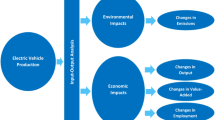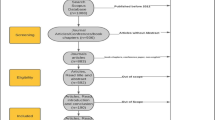Abstract
Based on the perspective of sustainability transitions (ST) theory, the paper dissects the opera-tional mechanisms of protected space driving emerging technology industrialization from an external system perspective, which is on the basis of defining essential characteristics and func-tional attributes of protected space. Meanwhile, it structures a three-dimensional evaluation model of protected space from the perspective of internal mechanism by introducing the policy mixes method. Finally, taking the Chinese New Energy Vehicle (NEV) industry as the example and using the system dynamics modeling method, the paper designs different simulation schemes from three dimensions of horizontal evolution trend, three types of policy instrument change and policy mixes of protected space, to predict and analyze the operation effect of protected space. The results show that the Chinese NEV industry is in the stage of market niche entry, and corresponding measures should be taken to increase the market scale, form effective demand and scale effect, and promote the diffusion of market niche; the effect of policy mixes is better than that of the single policy instrument; specific policy mixes should be adopted to develop simultaneously from both the supply and demand sides to improve the industrialization level of NEV.
Similar content being viewed by others
References
Zhang G Y, Xie W H, Hu R J, et al., Subversive Innovation: SNM Perspective, Science Press, Beijing, 2016.
Liu Y X, Tan R J, Zhang G Y, et al., Summary and prospect of research on sustainable transformation theory, Scientific and Technological Progress and Counter-measures, 2018, 35(18): 152- 160.
Kemp R, Schot J, and Hoogma R, Regime shifts to sustainability through processes of niche formation: The approach of strategic niche man-agement, Technology Analysis and Strategic Management, 1998, 10(2): 175–196.
Weber M and Hoogma R, Beyond national and technological styles of innovation diffusion: A dynamic perspective on cases from the energy and transport sector, Technological Analysis & Strategic Management, 1998, 4: 545–566.
Geels F W, Disruption and low-carbon system transformation: Progress and new challenges in socio-technical transitions research and the multi-level perspective, Energy Research & Social Science, 2018, 37: 224–231.
Geels F W, Schwanen T, Sorrell S, et al., Reducing energy demand through low carbon innovation: A socio-technical transitions perspective and thir-teen research debates, Energy Research& Social Science, 2018, 40: 23–35.
Smith A, Voss J, and Grin J, Innovation studies and sustainability transitions: The allure of the multi-level perspective and its challenges, Research Policy, 2010, 39(4): 435–448.
Lindberg M B, Markard J, and Andersen A D, Policies, actors and sustainability transition pathways: A study of the EU’s energy policy mix, Research Policy, 2019, 48(10): 103668.
Smith A and Raven R, What is protected space? Reconsidering niches in transitions to sustainability, Research Policy, 2012, 41(6): 1025–1036.
Smith A, Kern F, Raven R, et al., Spaces for sustainable innovation: Solar photovoltaic electricity in the UK, Technological Forecasting and Social Change, 2014, 81: 115–130.
Geels F, Technological transitions as evolutionary reconfiguration processes: A multi-level perspective and a case-study, Research Policy, 2002, 31(8): 1257–1274.
Edmondson D L, Kern F, and Rogge K S, The co-evolution of policy mixes and socio-technical systems: Towards a conceptual framework of policy mix feedback in sustainability transitions, Research Policy, 2019, 48(10): 103555.
Raven R, Towards alternative trajectories? Reconfigurations in the Dutch electricity regime, Research Policy, 2006, 35(4): 581–595.
Smith A, Translating sustainabilities between green niches and socio-technical regimes, Technology Analysis & Strategic Management, 2007, 19(4): 427–450.
Rgensen U J, Mapping and navigating transitionsThe multi-level perspective compared with arenas of development, Research Policy, 2012, 41(6): 996–1010.
Verhees B, Raven R, Veraart F, et al., The development of solar PV in the Netherlands: A case of survival in unfriendly contexts, Renewable& Sustainable Energy Reviews, 2013, 19(1): 275–289.
Heiskanen E, Jalas M, Rinkinen J, et al., The local community as a “low-carbon lab”: Promises and perils, environmental innovation and societal transitions, Renewable& Sustainable Energy Reviews, 2015, 14: 149–164.
Heiskanen E, Nissila H, and Lovio R, Demonstration buildings as protected spaces for clean energy solutions — The case of solar building integration in Finland, Journal of Cleaner Production, 2015, 109: 347–356.
Ren H Y, Cheng S B, and Huang L C, System dynamics research on regional industrialization of emerging technologiesTaking new energy automobile industry as an example, Scientific and Technological Progress and Counter-measures, 2010, 27(13): 39–43.
Ren H Y, Cheng S B, and Huang L C, Research on industrialization strategy of emerging technologies based on system dynamics, Scientific Research Management, 2013, 34(5): 21–31.
Zhou H, Liu J Y, Liu Y B, et al., Derivation of electric vehicle scale based on system dynamics, Journal of Sichuan University (Engineering Science Edition), 2016, 48(S1): 178–186.
Hoogma R, Exploiting Technological Niches: Strategies for Experimental Introduction of Electric Vehicles, Twente University, Enschede, 2002.
Jacobsson S and Lauber V, The politics and policy of energy system transformation explaining the German diffusion of renewable energy technology, Energy Policy, 2006, 34(3): 256–276.
Kivimaa P and Kern F, Creative destruction or mere niche support? Innovation policy mixes for sustainability transitions, Research Policy, 2016, 45(1): 205–217.
Canils M C J and Romijn H A, Strategic niche management: Towards a policy tool for sustainable development, Technology Analysis& Strategic Management, 2008, 20(2): 245–266.
Lopolito A, Morone P, and Taylor R, Emerging innovation niches: An agent based model, Research Policy, 2013, 42(6): 1225–1238.
Schneider M T, Schade B, and Grupp H, Innovation process fuel cell vehicle: What strategy promises to be most successful, Technol. Anal. Strateg. Manage, 2004, 16(2): 147–172.
Kwon T, Strategic Niche management of alternative fuel vehicles: A system dynamics model of the policy effect, Technological Forecasting and Social Change, 2004, 16(2): 147–172.
Author information
Authors and Affiliations
Corresponding author
Additional information
This research was supported by the National Nature Science Foundation of China under Grants No. 71874037, the Surface Project of the National Nature Science Foundation of China under Grant No. 71673062, Guangdong Natural Science Fund Project under Grant No. 2018A030313397, and Guangdong Soft Science Key Project under Grant No. 2018B070714019.
This paper was recommended for publication by Editor WANG Shouyang.
Rights and permissions
About this article
Cite this article
Liu, Y., Ou, C., Zhang, G. et al. Research on the Effect Evaluation of Protected Space Driving New Technologies Industrialization from the Perspective of ST. J Syst Sci Complex 33, 475–509 (2020). https://doi.org/10.1007/s11424-020-9178-9
Received:
Revised:
Published:
Issue Date:
DOI: https://doi.org/10.1007/s11424-020-9178-9




